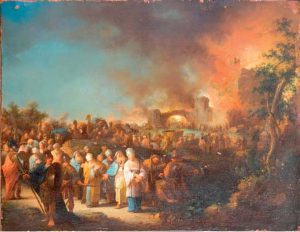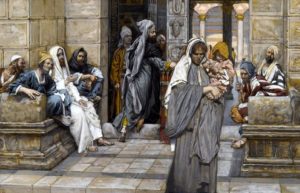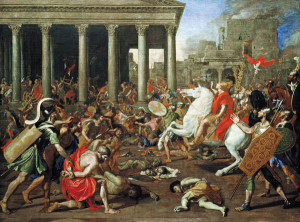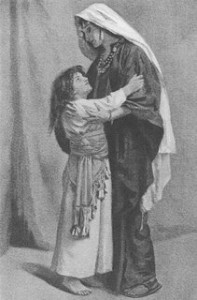Thoughts on Sunday’s Lessons for Nov. 14, 2021
First Reading (Track One): 1 Samuel 1:4-20
Almost six months ago, as the long season after Pentecost began, we heard several readings about the Prophet Samuel, who followed God’s commands to go out and find the youth – the shepherd David – who would grow up to become Israel’s king.

Zburzenie Jerozolimy (Destruction of Jerusalem, 1750s), oil painting on canvas by Johann Georg Trautmann (1713-1769). Tarnowskie Góry Museum, Silesia, Poland. (Click image to enlarge.)
Now, as the Pentecost season approaches its end, we return to the first chapter of Samuel time to hear the story of Samuel’s mother, Hannah. Troubled in her heart because she is unable to bear children, Hannah is also verbally abused by a friend over her barrenness. She prayed constantly, and her prayers were answered: She gives birth to Samuel, who will become the last of the judges who governed Israel, and who would anoint Saul to be its first king.
First Reading (Track One): Daniel 12:1-3
The long Pentecost season is drawing to its close. In two weeks Advent will begin, as we prepare to celebrate Jesus’ birth on Christmas Day. Sunday’s readings foreshadow a central theme of Advent: our hope of resurrection and new life. Our Track Two first reading is from the book of Daniel, one of the last books written in the Old Testament. Its narrative reflects Israel’s persecution under Greek rule in the 2nd century BCE. This reading begins Daniel’s lengthy “apocalyptic” vision – a genre similar to Revelation – that envisions ultimate triumph. It introduces the idea of a physical, bodily resurrection of the dead, the first time that this theological concept is raised in the First Testament.
Alternative to the Psalm (Track One): 1 Samuel 2:1-10
In place of a passage from the Psalms this week we sing the prayer of Hannah, in which she celebrates her joy over the birth of her child in words that are mirrored in the New Testament in Mary’s song, the Magnificat. Both prayers sing of God lifting up the lowly and the poor while casting down the rich and powerful. But Mary, bearing the child who will become the Prince of Peace, will not repeat the words of vengeance, battle, and judgment of enemies that we hear in Hannah’s song.
Psalm (Track Two): Psalm 16
The reading from Daniel promises a heavenly reward to those who remain faithful, and the Psalmist reassures the people that God will not abandon those who always follow God. A different fate awaits the unfaithful who follow other gods: They may see their troubles multiplied, and God will not so much as speak the names of their gods. But God will never abandon those who remain faithful, the Psalmist sings in reassuring tones: The hearts of the faithful will be glad and their spirits will rejoice.
Second Reading: Hebrews 10:11-14 (15-18) 19-25
Now we reach the last of our seven Sunday readings from the letter to the Hebrews. Two chapters remain in the full letter, but this passage concludes the extended narrative that we have been following: Jesus is the great high priest who offered for all times a single sacrifice superior to those of the old priests in the Temple of Jerusalem. This passage calls on its readers to hold fast without wavering, to provoke each other to love one another and do good deeds, and to encourage one another all the more as they see the day of God’s coming draw near.
Gospel: Mark 13:1-8
Our yearlong journey through Mark’s Gospel comes to its end Sunday. These concluding verses follow immediately after last week’s account of the poor woman who gave her last two small coins to the Temple treasury. Jesus, still angered by the hypocrisy of the scribes, prophesies the destruction of the Temple, declaring that all the great buildings on the Temple Mount will be destroyed, thrown down, not one stone left upon another. These are the words that the high priest will hold against Jesus, but we will set that narrative aside now as we approach Advent and prepare to celebrate the Incarnation, Jesus as God with us.



